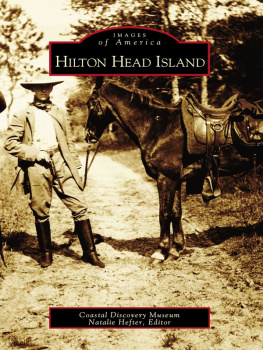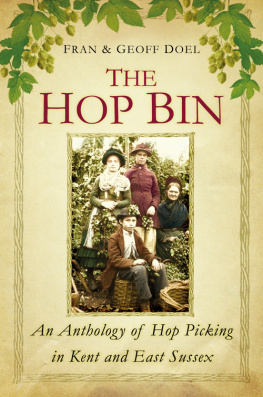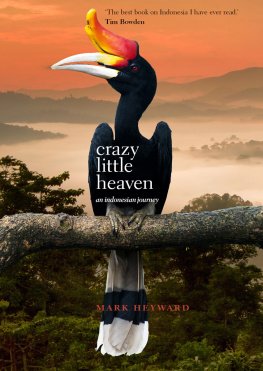

Published by The History Press
Charleston, SC 29403
www.historypress.net
Copyright 2005 by Fran Heyward Marscher
All rights reserved
Cover Image: Art by Lynia K. Potter.
First published 2005
Second printing 2006
Third printing 2010
e-book edition 2013
Manufactured in the United States
ISBN 978.1.62584.449.1
Library of Congress Cataloging-in-Publication Data
Marscher, Fran.
Remembering the way it was at Hilton Head, Bluffton & Daufuskie / Fran Heyward Marscher.
p. cm.
Includes index.
print edition ISBN 1-59629-061-7 (alk. paper)
1. Oral history. 2. Hilton Head Island (S.C.)--Social life and customs--Anecdotes. 3. Bluffton (S.C.)--Social life and customs--Anecdotes. 4. Daufuskie Island (S.C.)--Social life and customs--Anecdotes. 5. Hilton Head Island (S.C.)--Biography--Anecdotes. 6. Bluffton (S.C.)--Biography--Anecdotes. 7. Daufuskie Island (S.C.)--Biography--Anecdotes. I. Title.
F277.B3M25 2005
975.7990430922--dc22
2005011679
Notice: The information in this book is true and complete to the best of our knowledge. It is offered without guarantee on the part of the author or The History Press. The author and The History Press disclaim all liability in connection with the use of this book.
All rights reserved. No part of this book may be reproduced or transmitted in any form whatsoever without prior written permission from the publisher except in the case of brief quotations embodied in critical articles and reviews.
CONTENTS
PREFACE
These oral histories almost slipped away. Most of the Lowcountry folk who lived here in the early twentieth century have passed on. When I was a child growing up in their midst, I had no idea of the stories they could have told me if I had asked.
Fortunately, Terry Plumb, editor of The Island Packet, Hilton Head Islands daily newspaper when I conducted most of the interviews as a reporter in the 1980s, encouragednay, droveme to find out how these men and women really lived.
Fortunately, the late Daniel Hasell Heyward Jr., my father, a lifelong resident of the area, knew most of the people in this book and introduced me to many of them.
Fortunately, once the characters of Remembering the Way it Was realized that I was both curious and respectful, they opened up.
Fortunately, Bill Marscher, my husband, saw these profiles as valuable context for the next generations of Lowcountry folkboth the bin yeahs (natives) and the cum yeahs (settlers). He encouragednay, droveme to organize them into this book. He then put his technical skills and his patience to work cleaning up the old photographs.
I very much appreciate permission from The Island Packet for the use of storytellers pictures.
My hope now is that readers will come to like these storytellers, resourceful souls who bloomed where they were planted.
Fran Heyward Marscher
Bluffton, South Carolina
Section of the South Carolina Lowcountry where the storytellers lived. Map from the South Carolina Land Improvement Co. 1877
INTRODUCTION
The names and stories here are as real as the live oaks that dominate the regions landscape. A few of the storytellers are still living, but most have died since being interviewed. They did you and me the favor of probing and sharing their recollections about their families and friends, and about life as far back as they could remember.
Did they recall everything accurately? Did they tell their stories truthfully? Can we verify what they said? Whatever is represented as a significant historical fact has been checked. Whatever else readers will find are scenes that came into the clearing as the storytellers traveled their memory trailsimpressions that lasted half a century or more. Their individual tales overlap and intertwine, and in some cases, the tales come close to contradicting one another. Trying to unravel every mingled thread, to clarify all potential confusion, to nail down every detail would have killed this project. My impression is that if these folk did not tell the Gods truth about how it really was, they at least told it the way they remembered it.
Most of the characters were born in the Lowcountry. Most spent their lives close to where they were born. Those who were born elsewhere either contributed measurably to the cultural mix while they lived here or observed the Lowcountry through unique eyes. What an opera might be produced if one could put these Lowcountry characters on stage to interact with one another and entertain an audience. Men and women, black and white would compose the cast. Hovering in the corners would be the ghosts of the children they once were. The music would range from simple recitative, in which a single character laments a grief or shouts a joy; to memorable arias; to complex duets, trios and choruses about squalls on the sound, fires under the washpots, dances in the society halls, weddings, baptisms and all-day preaching.
For props, the Lowcountry players would need a bateau (flat-bottom rowboat) and a steamboat, an ox and a thoroughbred horse, a handmade fiddle and a grand piano. They would need a patch of okra, Atlantic blue crabs and a wood-burning stove. The scenery would include salt marsh, courtrooms and dining rooms, a few big houses with finely carved mantelpieces and a lot of small cabins with blue paint on the door to protect against bad luck.
Taken together, these characters, all intimately knowledgeable about the texture and the quirks of the Lowcountry in the first half of the twentieth century, present a panorama that will never be seen again. For them, this place has been home. They had the extraordinarily good fortune of knowing it the way it was.
PERSPECTIVE ON THE BIRTH YEARS 18811898
In the last two decades of the nineteenth century, the southernmost corner of South Carolina known as the Lowcountry was a world to itself, a remote area of mosquito habitat. The big, profitable plantations were long gone. The telegraphs and the railroads had not yet come. There was no industry.
A catastrophic hurricane in 1893 drowned two thousand or more and left seventy thousand destitute for almost a year. Afterward, for decades, families continued to wrench their livelihoods out of the soil and the creeks. Even the brightest and most ambitious found limited opportunities and few choices about how they would live.
It is true that from some points of view, the Lowcountry was heaven on earth. The people who lived there, black and white, helped one another and trusted one another; the children grew up in extended families and among familiar, caring neighbors. But that isolation was stifling as well as nurturing. Just as a small pond grows stagnant without the recharge of fresh water, the communities recycled knowledge and superstitions until they were almost worn out. Rarely did travelers visit Bluffton, Pritchardville or Okatie, or Hilton Head Island or Daufuskie Island. Rarely did Lowcountry folk go anywhere else, not even to Beaufort, the county seat. News arrived by steamboat, and only long after the news was cold. Columbia, the state capital, seemed as far away as London, England.











